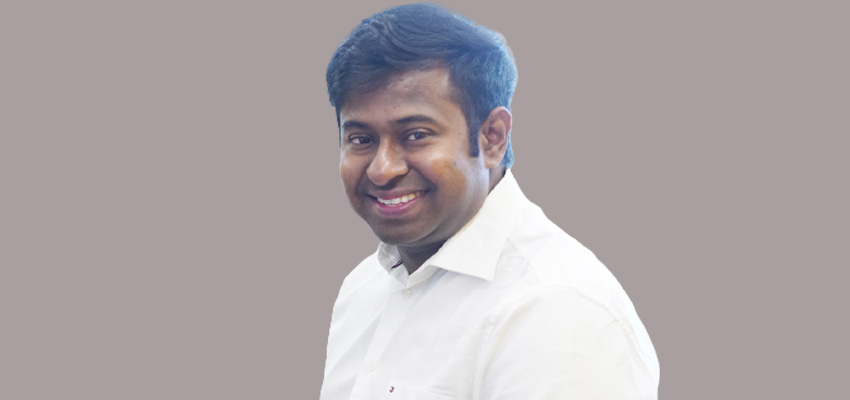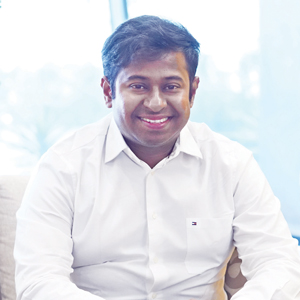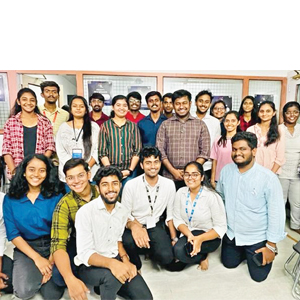Humane Resources Manager

"The reason I picked human resources was because I fundamentally saw people creating value. I realised that if you put in the right intervention or you take care of people in a certain manner, you respect them, you recognise them, give them a purpose—they can really thrive and make changes"
-Akhilesh Reddy Jukareddy
As a human resources professional, Akhilesh Reddy Jukareddy, is contributing to the industry and human services with equal zest. At present he is in the role of HR Business Partner at Wipro Switzerland, and is responsible for Employee Experience at Europe. From his schooling days till now, Akhilesh has taken multifaceted undertakings of human services, entrepreneurship and human resource manager. He is the founder of the largest student NGO in Hyderabad, Street Cause, a national student-run NGO, which works with students across cities in India. He is also the co- founder of SuperHealthy, an emerging startup in the food space, acquired by YogaBar in 2022. Akhilesh has won the sixth NHRDN Professor Ram Charan Young HR Icons Award for 2020 in the ‘Professional’ category and most recently, Economic Times “Emerging HR Leaders Award 2023”, as an emerging talent in the human capital space. In an exclusive interview with Corporate Citizen, he talks about his humane connection with society and human resources, living his entrepreneurial dream, how HR leaders can be business leaders and much more
Corporate Citizen: Take us through your education and career journey. You graduated with a BTech engineering degree and then you went on to do your MBA in HR—what inspired you to switch from tech to HR field?
Akhilesh Reddy: Engineering was probably more a choice of natural instinct. I kind of went with the flow—I did love technology. At that point of time being young, you understand engineering as much as you enjoy computer. I was very fascinated by computers, as I started using it from when I was in my 4th grade. Doing MBA in human resources was a very specific and a conscious choice. The reason why I picked HR was because of my experiences in Street Cause—today the largest student run NGO in the state of Telangana, which has representations in six cities—founded by me and a group of my friends. So, my experience in Street Cause, led to a very clear understanding of the impact of what people can do. Because, we were too young (17-18 years’ age) and we were really able to create an impact. Today I call it talent management, at that point of time I didn’t know what it was. But, that really fascinated me—impact that people could really create—in terms of bringing in more people, in terms of value for the society and that’s what led me to picking up human resources.
CC: Is your BTech education background helping you in your HR role?
I would say yes, because I understand technology and I worked on digitally transforming Street Cause. For example, recently we did a concert, wherein other than BookMyShow, the passes were also done through our own app. The volunteers sales targets tracking and pass sales, everything was done digitally. As an organisation at Street Cause, or any organisation, you want it to be technology driven.
Coming back to Wipro, I worked on lot of digitalisation of processes. Very simple things like overtime portals and all of that— some of it was Excel driven and automating that was a very exciting as a process. I believe technology is the future and I am a big fan of technology. And for Street Cause, the NGO that we started, one of the priorities is technology. I deeply believe that anyone who does not partner with technology will not progress, whether you are in HR or any other field.
CC: Your father is a senior and experienced HR professional. Has he in a way been an influencer and inspiration, for you to choose the HR field?
Everyone believes that I took human resources because my dad has been in HR profession. But, at least for me when I think about that, it wasn’t the reason. The reason I picked human resources was because I fundamentally saw people creating value. I realised that if you put in the right intervention or you take care of people in a certain manner, you respect them, you recognise them, give them a purpose—they can really thrive and make changes. And, coaching kind of things can have a huge impact on how someone who has not realised his/her potential, can start realising his/her potential and doing more. So for me, all these words of purpose and all that are coming in right now—at that point of time with Street Cause, I was doing similar things with different names. I would say, you always need to have a reason. So, I believe it’s more driven organically from my experiences of Street Cause.
"believe technology is the future and I am a big fan of technology. I deeply believe that anyone who does not partner with technology will not progress, whether you are in HR or any other field"
CC: You joined Wipro in the year 2014 as Senior Executive HR, in Bengaluru and have stayed with Wipro for last eight years, currently playing the role of HR Business Partner. The young generation especially millennials, have a reputation for job-hopping. What made you stay with one company for so long and what is your advice to those who keep moving for the right career fit?

I continued to stay with Wipro because it is a terrific organisation. To start with, I am a big fan of Mr Azim Premji. I think I was in 8th Grade, when I was super inspired seeing an article on the kind of contribution he has made towards education in India. And, I believe that an organisation like Wipro, is driven by a true purpose to add value to the society and make the society a more sustainable place. While that is one thing, the second is, my managers have really been terrific and inspirational in terms of the kind of direction and guidance that they have given me. And third, the quality of work that I did, I believe that I was given the best of the opportunities. While I was given opportunities, I walked a few steps towards the result—they gave me more of opportunity to work on bigger projects and better projects. I think, at work, at least for me, learning and progress is really important. I want to take up different assignments, very challenging one’s and very difficult one’s and Wipro has never ever failed to throw those real opportunities to me.
Currently I work with my country head and managing director and I really appreciate the challenges he gives us. One of it was, to be the top employer in Switzerland. I am grateful for the fact that, we ended up as the number one employer for Switzerland, in 2023.
I have met Mr Azim Premji a few times and again it has been a greatest honour to host him in Zurich. Because, he used to go to Davos for the World Economic Forum and he obviously took a quick stop at Zurich, he used to visit our Zurich offices and colleagues. It’s an unbelievable legacy— it’s amazing to host him and be next to him, to talk to him and just walk with him.
CC: In your growth trajectory in Wipro as an HRM, what were the initial challenges you faced and how did you overcome them?
I started off as a senior executive-HR, but for me more than the designation what was important was the role. Because, in Wipro there is flexibility for you to go for higher and impactful roles at different designation bands, and my journey started off as a senior executive in 2014 to being a senior manager right now. When I was of around 22-23 age, was HR Business Partner for like 600-700 IT professionals. When I just walked in, it obviously felt very overwhelming.
The first three months at Wipro, was really strong learning and challenging phase, like the learning curve was obviously steep in there. But, after that it was pretty good—environment at Wipro is very collaborative. Lot of my seniors have helped me a lot, I can’t stop thanking them.
When someone starts of in a company, it is very important for them to get help from the environment, a little bit. It makes things easy and better—that shaping of your mindset can really come in. If there is someone giving you that tips and hints and making you feel at ease—I got that at Wipro.
My experience at Street Cause has also helped me a lot, because I had those student leadership experiences of solving problems, of making decisions, to be able to move fast and try execute something effectively, to communicate, to influence—these skills have really helped me.
CC: After working for three years in India while in Wipro, you were moved to abroad offices in many European countries. Did you face issues with aligning to new organisational culture and cross-cultural differences, while managing global workforces?
I think Wipro as a culture obviously is similar in terms of the habits of respect in stewardship. But, there is obviously a local touch for sure—it is unbelievably there and it’s there at a very high level. I was may be like 25-26 age, when I moved to Frankfurt, where they speak German and the culture is very different, and I was a HR business partner. As an IT professional I feel it’s a little more straightforward, because you are coding, programing, all development problems, and people manage it. But, as HR you need to know the local law—need to know the labour law and I had to go for formal representations/ arbitrations. The local people know the law way better than you, so you better have to be good. Imagine, a German coming to India and being a HR business partner and trying to discuss Indian law with an Indian—that’s how the world now is, truly global. I was working with an HR Head of Europe. I had to work really hard to understand the law and culturally try and integrate and speak to lot of people. But, I enjoyed the process thoroughly and it was a great learning experience. As a traveller you will agree that when it’s obviously a very different situation, there is ambiguity, you enjoy the ambiguity and you try to learn from the flavour of it.
"The millennials and Gen-Z, they are driven by purpose. A lot of people would say that they have very short term of things. The earlier generation was much simpler with lesser number of opportunities; influence was by hierarchy. The new generation is about influence by meaningful relationships and purpose at work"
CC: With HR tech coming in, will the HR role in an organisation shrink and remain to be a specialist role like HR Business partner and so on?

Sure there are going to be many roles that are going to be taken over by AI, Machine Learning and lot of it is going to be around automation. But, something like cognitive skill, emotional intelligence, creative thinking, coaching, human centric decision making, and social influence, which the HR people do, will continue to stay. I believe transactions will go away. For example, how many leaves do I have? Why is my salary deducted? These questions will not be answered by HR, it will be answered by a bot. Transactional roles, in the next 3 -5 years, I would say will be taken over by automation. For example, scheduling is also a role in recruitment, sourcing is a role in the recruitment. Like I look at the CV and identify the key words, that is going to be automated for sure. They are going to use certain scripts and scans to see if the person has the right key skills.
I believe, the future is going to be around people who are building their cognitive skills, building influence, building collaborations, who are able to build right set of networks, who are having human centric decision making skills, who have high quality emotion quotient, resilience, and emotional intelligence. I think that will be the future of human resources and there will be a lot of people in HR who are going to work on technology. They will solve the technology problems in the human resources. Now would that directly shrink the HR role? The answer to that in my view is, yes it will, but I will become more strategic. It is going to happen and lot of people might not see it coming, because change takes time, but the change has started. But, it is also a great opportunity for us to really reinvent ourselves, to be skilled at that manner, to add greater value for employee experience and for the larger good of the society. By 2030, obviously there is going to be massive disruption in terms of how HR will function.
A lot of recruitment work, I believe, which is more back end, will go into automation. A lot of interviewing is also going into automation. But, I think that final decision making of strategic roles will obviously remain with HR. But roles that are being hired in thousands—you might not have managers making these decisions to hire these people. But, you might have a bot that is doing the technical assessment, that is doing the communications skill check and then there is background verification and then they get a direct offer letter.
CC: How did you jump on to the entrepreneurial bandwagon, in 2019, being part of the startup called “SuperHealthy” as mentor and investor, which got later acquired by YogaBar, a leader in the FMCG space?
My friends in Hyderabad wanted to start something and they wanted me to join in as a partner and cofounder, not fulltime but to help them with strategy and growth. That’s how it started and I was very happy to do it because one, they are my friends and two, I was very excited about challenging opportunities where I can learn—that really drives me. I am also very excited about understanding how business works from a business side, understanding P&L—how do you do your revenues, profits. And, to be able to make that happen and to do the right interventions to make that happen, is a very exciting thing for me. So, this was my opportunity to kind of learn that. I have also learnt because of the HR business partner role and I was working with business leaders very closely—I did understand how P&L works.
I used my weekends to work with the team from SuperHealthy. My role was to help the team with strategy and growth. Overall in summary, we did revenue (ARR) close to around INR 13 crores in FY 22 and we built India’s number one nuts-and-seeds product. We were number one on Amazon for two years—we became number one in less than six months. Finally, we sold it in June 2022, we did hundred per cent exit. Our IP was acquired by YogaBar, and now YogaBar is being acquired by ITC.
The future is going to be around people who are building their cognitive skills, building influence, building collaborations, who are able build right set of networks, who are having human centric decision making skill, who have high quality emotion quotient, resilience, and emotional intelligence
CC: You are the founder chairman of Street Cause, a national student-run NGO and also the largest student-run NGO in Hyderabad, which you started in 2009 and which is very near and dear to your heart. At an age when everyone looks at carving out their career journey, what made you turn towards social service and start an NGO?

In the year 2009—my friends were terrific, they had great leadership capabilities. I kind of had this idea of, how do we use our leadership potential to do something more productive and had the instinct of serving the society, since I was a kid. I also volunteered a lot—I volunteered for an organisation called Vibgyor, to raise funds for the blind, when I was in my 4-5th grade. I volunteered in Ramakrishna Math, for packing library books for like five hours every day during my holidays after twelfth grade. Serving motivates me and I enjoyed it.
At present more than 5000 students are helping with the Street Cause—then there is CEOs office where a group of 21-22, who are just out of college and are a brilliant bunch of people who lead Street Cause. There is a CEO, the CFO, the COO and CMO, who are fulltime working for Street Cause, the rest of the organisation is completely students. Then there are people like me (alumni) who help them. But from this year, I am going to take a back seat, leaving everything to be done by the CEO’s office and as advised by Meghana Mojjada (Governor in Chief). We try to help the underprivileged in the best way possible. We help orphanages and old age homes. We do women empowerment camps, help people with employment, do health and hygiene camps, do infrastructure for schools, and do environment related projects. We have multiple units—we have animal welfare unit called Street Cause Paw. We have a unit called Street Cause Pride, for LGBTQ+ community, to create awareness around the lesbian and the gay community. We do something called Street Cause Gold, its for people who are not students, who want to be a part of Street Cause. We just launched another unit called, Street Cause Water Project, where we want to focus on water conservation and clean water availability, because we really believe that clean water is something that has to be available and accessible, easily for everyone, without wasting it. We are in close to 45 colleges in Hyderabad, 10 colleges in Chennai, and in other cities like Vizag, Kochi, Bengaluru, Pune.
Now we are changing our vision at Street Cause—we don’t want to call ourselves an organisation that’s trying to help out the underprivileged in the best way possible. We want to be an organisation that is going to be the biggest platform in the country for students, to be socially conscious leaders. We want to enable students to become socially conscious leaders. We want to solve the problems in the society by looking at one problem at a time, but we want to start building socially conscious leaders also. Because, we believe that if you want to solve the climate problem, it’s not about picking just recycling and you being conscious, but if you build thousands of climate leaders, the climate problem will be solved, because everyone is conscious, they are aware and they are coaching more people. So, we want to build socially conscious leaders through community service—that is our agenda.
We are heading towards 2030, with our vision to be in 30 cities. We are going to do three things — one, we are going to be large. Two, we are going to be technology driven. Three, we are going to be very performance driven. With all these, we are going to impact the society in a very positive manner— could be health, could be education, quality life for old age, creation of employment and so on. But, whatever we do, we want to create an impact.
Sure there are going to be many roles that are going to be taken over by AI, Machine Learning and lot of it is going to be around automation. But, something like cognitive skill, emotional intelligence, creative thinking, coaching, human centric decision making, and social influence, which the HR people do, will continue to stay
CC: HRs have to manage attrition and its impact on business, especially attrition among the millennials and Gen-Z. So, as a millennial HR manager what is your strategy to minimise this impact?

I know everyone is calling it a problem and the way I believe it can work—obviously IT attrition is high and it’s been very high because of the great resignation. But again, if it is attrition and about generation, they are two different things. To talk about the generation, I really and genuinely believe that they are driven by purpose. A lot of people would say that they have very short term of things. The earlier generation was much simpler with lesser number of opportunities; influence was by hierarchy. The new generation is about influence by meaningful relationships and purpose at work.
For example, at Street Cause, the CEO’s office is paid three lakh rupees. The four people who are working here are getting much bigger offers, they can get any job with their expertise and profile. There are alumni of Street Cause, who give jobs to Street Cause people. They have all these opportunities, but they chose to take the least possible salary and work for the Street Cause CEO’s office. They work a lot to run an organisation of this scale. It’s only now that we are going to increase their salary. If you try to understand their psychology, it is incomprehensible even for their parents and their friends, and they are doing it. Is this for money? There is no money. Is the role great? It is absolutely great, but it is also coming with lot of sacrifice and pain. Why they are doing it? They are looking for the purpose and learnings. Their purpose is to solve. So, I believe that this generation is great— but we need to work towards building a strong purpose and deep meaningful relationships to get the best out of them.
CC: How will you define the role of today’s human resources leader?
I am hundred per cent sure they will be good leaders. The Alumni of Street Cause has become CEO of SuperHealthy. Another Alumni at Street Cause CEO office, has started a company called “Get Bike”, one of the first bike taxis in the country, which was acquired by Rapido service company. There are many examples, wherein Street Cause people are wonderful entrepreneurs—the learnings that they have acquired. So, Street Cause people are doing multiple things, they have become entrepreneurs. They do MBA from top B-schools, they work for corporates, they lead positions in human resources—its very diverse.
It’s always about people management effectively, and HR people are good at that. HRs I believe can be great business leaders, I hope to see many more HR people in business role. It will have a positive impact at firms, business and society at large.
CC: Companies are ending work-from-home for their employees and they want their employees back in office. The Covid-19 pandemic had led to a significant shift to remote working practices. How do you see the future of work henceforth?
I believe hybrid model is a great way forward—allowing building strong bonds by working from office—few days a week and also flexibility for people to work-from-home for few days in a week. Of course, it can differ from firm to firm. But, this I believe Hybrid is a great model that has emerged as future of work. I think the future will also allow more organisations to move into a borderless employment if they would like—a truly global remote working. We do see this happening a lot in Dubai right now.
It’s always about people management effectively, and HR people are good at that. HRs I believe can be great business leaders, I hope to see many more HR people in business role. It will have a positive impact at firms, business and society at large
CC: Wipro had fired its 300 employees for Moonlighting. Considered as ‘future of work’ is it ethical? What is your point of view?

Not on my company’s behalf, but my personal opinion on this is what Wipro did is right, because they were not questioning people’s passion projects. For example, Wipro never questioned that you did some weekend kind of freelance work—Wipro had no problem with that. Wipro has highlighted issues where employees had two employment contracts, or someone had three employment contracts. So, Wipro’s view is that, when you are working for Wipro, for 8-9 hours a day you are contractually committed and you cannot be working for another firm during that time. Some people directly worked for competitors while they were full time working at Wipro; that’s a massive breach of confidentiality! You are allowed to work for 8-9 hours as per your contract, where are these 18 hours adding up? So, it means you are taking 100 per cent work salary here and also for same time you are taking 100 % salary from somewhere else—I don’t view that as fair. When you are employed, you are expected to be productive for those nine hours fully dedicated to just that respective job role. Wipro encourages transparency to discuss with the firm on any possible conflict, agree and move forward.
CC: What is your future career plan henceforth?
Wipro is a great firm and I am more than happy to work for it. I also want to try and venture out into business leadership roles, because I have done human resources for like eight years’ now. I also want to get a deeper understanding of business—I have some understanding because of SuperHealthy, I have some startup experience because of SuperHealthy and Street Cause—but I also want to get my hands-on in terms of growing the business, handling revenues and handling profitability. That’s something I am looking forward to, in the next few years.